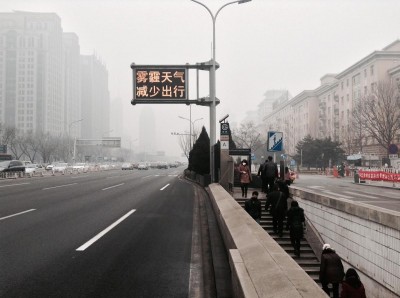When it comes to the war on its notoriously bad air, China is never short of novelties. A company in Beijing recently revealed plans to test drones that would be used to eliminate smog in polluted skies, part of an ongoing effort by authorities to appease public anger over the country’s trouble in the air.
In a sign of the government’s growing willingness to use advanced technology in its protracted fight against air pollution, Beijing said it will test fly soft-wing drones in designated airports and ports later this month, to spray catalysers that help clot pollutants so they can fall onto the ground.

Photo by Owen. Heavy smog engulfed Beijing in late February 2014. Electric traffic board reads:” Reduce outdoor activities in smoggy weather.”
It remains unclear which spots will the government choose to conduct the experiment.
The announcement, in recognition of the grim challenges Chinese government faces in curbing air pollution, came at a time of intensified national debate over PM2.5, fine particles deemed most harmful to public health as they can penetrate into human lungs.
“The soft-wing UAV can carry three times more weight than fixed-wing drones and is 90 per cent less expensive to operate. The purchase and maintenance cost of the new drone is 20 to 30 per cent cheaper than other types,” Ma Yongsheng, CEO of Aviation Industry Corporation of China, the state-backed company that develops the drones, was quoted by South China Morning Post as saying.
“The smog has worsened in recent years which not only affects the traffic and people’s mobility, but also threatens human health,” the company told a Chinese newspaper. “To carry out efficient smog-elimination work through the platform of aviation has become one of the many areas to focus in Chinese aviation industry”
Air pollution is blamed for the decreased life expectancy in northern China and often prompts schools to confine students to indoor activities.
Public aversion has grown so strong that the government cannot afford to look away. In his debut address to the annual National People's Congress earlier this week, Chinese premier Li Keqiang proclaimed the government would tackle pollution head-on. “We will resolutely declare war against pollution just like we declared war against poverty,” he said.
Since the airpocalypse in early 2013, China has resorted to various methods – from mini-filters handed out to police to put over their noses to the artificial rain that washes away the filth – to minimise the smog's impact on human health.
On a more practical level, Chinese authorities have vowed to scale back its steel production and coal use with promises to gradually phase out industrial overcapacity. But such moves add pressure to the government who wants to steer an already slowing economy away from an investment-driven model.
As the news of the upcoming fly test continues to garner news headlines, many Chinese have weighed in with mockery and doubted if the drones will be really effective.
Shuijin Ximo from Beijing wrote on popular microblogging site Sina Weibo:
简直是扯淡纯扯淡 快下马吧 糟贱国家的钱
It’s simply bullshit, please drop the plan and don’t spoil state finance.
Nightmelodysearching said:
治标不治本
It's only helpful on the surface but does not address the root cause.
Echoing the same sentiment was Wuweiwo:
这个方法恐怕是杯水车薪吧,中国有史以来对抗自然的只有失败二字;再说即使有所成效也只是治标不治本
I am afraid this method does little to tackle the problem. Throughout history, China has only been met with failure when it tried to combat nature. Besides, even it turned out to be effective, it's only helpful on the surface but does not address the root cause.
Dahao Haotou was skeptical as well:
雾霾这东西还是治本才靠谱,我想问你用化学的东西让雾霾消失了,能告诉我们原理和消除雾霾过程中会不会释放有害气体或物质吗?会不会仅仅是让微粒增大后自动落地,这样空气看起来就干净了!?
We need to tackle the root cause of the smog, I wanna ask, after getting rid of smog through the use of chemicals, will there be harmful substance or gas being released during the elimination process? Or is it just to bolster fine particles and let them fall automatically? Will the air be any cleaner?!
Anywei, a technology supervisor at a Beijing trade company, reacted jokingly:
因雾霾过大,该无人机试验屡次延后,最终取消项目。
Due to the density of the smog, the drone test has been postponed countless times and ended up being cancelled in the end.
Kaixin de Qingyu, a resident of Shenyang, was happy to give it a shot. She said:
不试怎知道。还是试一下好。
We wouldn't know if we don't try. It's better to try it out.







1 comment